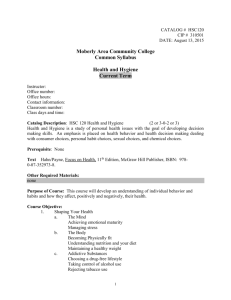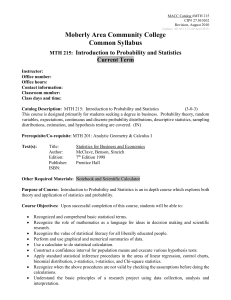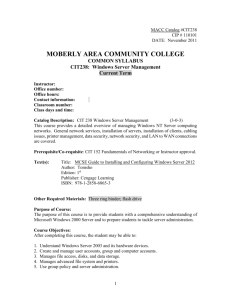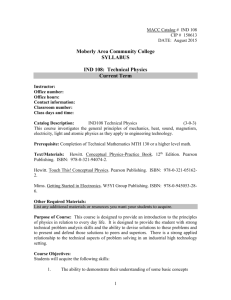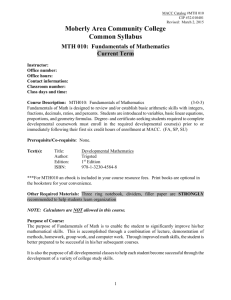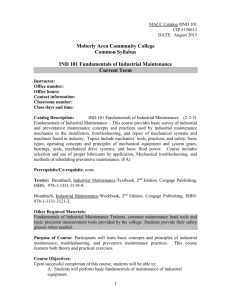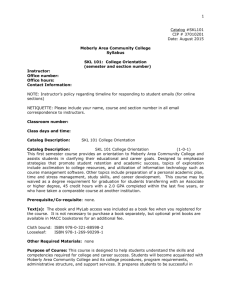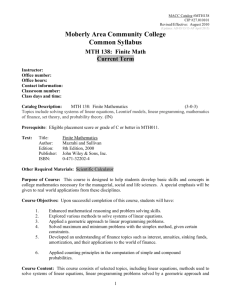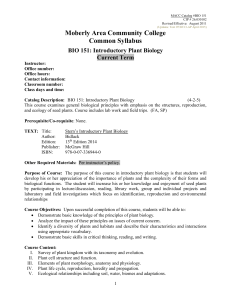MTH 202 Analytic Geometry & Calculus II
advertisement
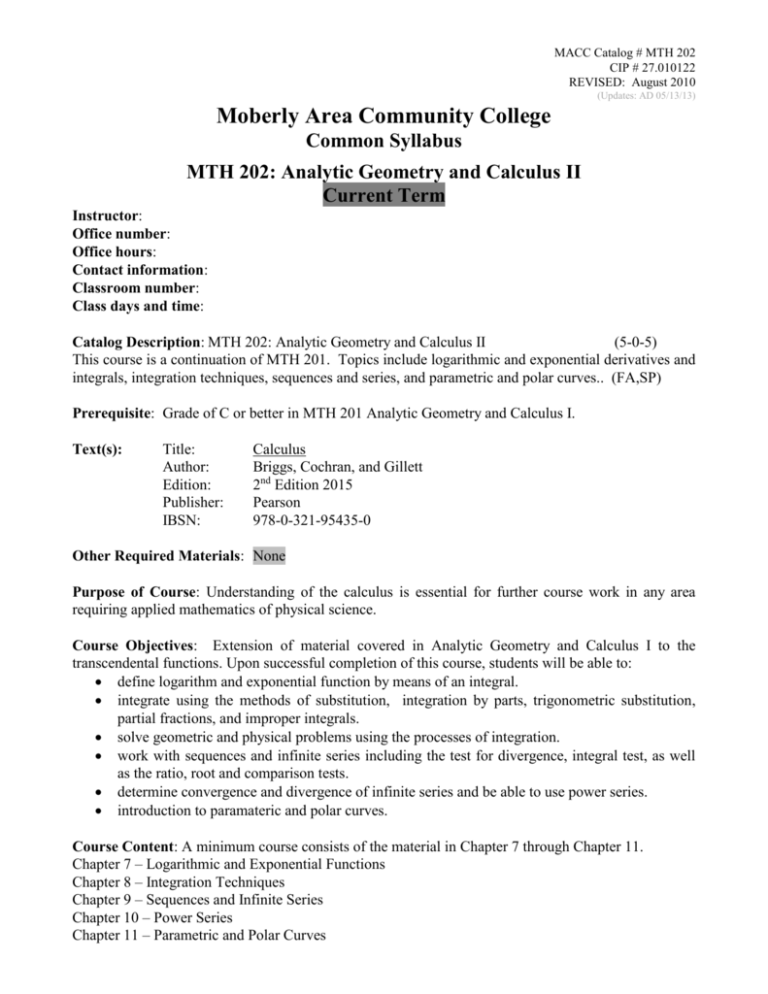
MACC Catalog # MTH 202 CIP # 27.010122 REVISED: August 2010 (Updates: AD 05/13/13) Moberly Area Community College Common Syllabus MTH 202: Analytic Geometry and Calculus II Current Term Instructor: Office number: Office hours: Contact information: Classroom number: Class days and time: Catalog Description: MTH 202: Analytic Geometry and Calculus II (5-0-5) This course is a continuation of MTH 201. Topics include logarithmic and exponential derivatives and integrals, integration techniques, sequences and series, and parametric and polar curves.. (FA,SP) Prerequisite: Grade of C or better in MTH 201 Analytic Geometry and Calculus I. Text(s): Title: Author: Edition: Publisher: IBSN: Calculus Briggs, Cochran, and Gillett 2nd Edition 2015 Pearson 978-0-321-95435-0 Other Required Materials: None Purpose of Course: Understanding of the calculus is essential for further course work in any area requiring applied mathematics of physical science. Course Objectives: Extension of material covered in Analytic Geometry and Calculus I to the transcendental functions. Upon successful completion of this course, students will be able to: define logarithm and exponential function by means of an integral. integrate using the methods of substitution, integration by parts, trigonometric substitution, partial fractions, and improper integrals. solve geometric and physical problems using the processes of integration. work with sequences and infinite series including the test for divergence, integral test, as well as the ratio, root and comparison tests. determine convergence and divergence of infinite series and be able to use power series. introduction to paramateric and polar curves. Course Content: A minimum course consists of the material in Chapter 7 through Chapter 11. Chapter 7 – Logarithmic and Exponential Functions Chapter 8 – Integration Techniques Chapter 9 – Sequences and Infinite Series Chapter 10 – Power Series Chapter 11 – Parametric and Polar Curves MACC Catalog # MTH 202 CIP # 27.010122 REVISED: August 2010 (Updates: AD 05/13/13) Assessment of Student Learning: Per instructor’s policy Description of Major Assignment(s)/Project(s): Per instructor’s policy Statement to Connect Course with General Education Outcomes or Technical Program Outcome Statement: In compliance with MACC’s General Education outcomes, the student who successfully completes this course will be able to: Demonstrate and understanding of scientific principles and computation skills and how to use them to solve problems and make informed decisions: o The student will demonstrate knowledge of basic principles of life and physical sciences. o The student will demonstrate ability to collect, analyze data, and interpret results in problem solving o The student will apply knowledge of principles to make informed decisions about the natural world. o The student will demonstrate the ability to use math and logic as formal symbolic systems in computation. Instructor Policies: Academic Dishonesty: MACC board policy is as follows: “Academic dishonesty by students damages institutional credibility and unfairly jeopardizes honest students; therefore, it will not be tolerated in any form.” Forms of academic dishonesty include but are not limited to the following: violations of copyright law, plagiarism, fabrication, cheating, collusion, and other academic misconduct. Incidents of dishonesty regarding assignments, examinations, classroom/laboratory activities, and/or the submission of misleading or false information to the College will be treated seriously. The procedure for handling academic dishonesty is outlined in the Student Handbook (Policy Handbook M.010). In cases of alleged academic dishonesty, the burden of proof is on the student, not on the instructor. Attendance Policy: Any student who misses two consecutive weeks of class during a regular sixteenweek semester or the equivalent proportion of class time during a shorter session will be dropped from the class by the instructor unless acceptable justification is supplied. Additionally, any student who misses more than one-fourth of the entire number of in-seat class meetings in a regular 16-week semester or the equivalent proportion of class time during a shorter session, may be dropped from that class by the instructor if, in the opinion of the instructor, the student does not have reasonable opportunity to succeed in the class. A student’s attendance rate will be calculated based upon the first day of the semester (not the student’s date of enrollment in the course). Student attendance must be defined in a different manner for online, hybrid, and virtual courses. Student attendance in these courses is defined as active participation in the course. Online, hybrid, and virtual courses will, at a minimum, have weekly mechanisms for student participation, such as any or all of the following methods: a. Completion of quizzes or exams b. Submission of assignments MACC Catalog # MTH 202 CIP # 27.010122 REVISED: August 2010 (Updates: AD 05/13/13) c. Participation in threaded discussions d. Communication with the instructor A student who does not participate in an online, hybrid, or virtual course for two consecutive weeks will be dropped by the instructor unless acceptable justification is supplied. As with ground courses, a student’s attendance rate in online courses will also be calculated based upon the first day of the semester. If a student does not demonstrate active participation in the online course within the first two weeks (or the equivalent proportion of class time during a short session), the student will be dropped as “never attended.” Simply logging into an online class does not constitute active participation. Students should be aware that their dropping a course and their last date of attendance in the course may impact their financial aid. (Policy Handbook I.090 and M.095) Tardiness: Per instructor’s policy Make-up and late work: Per instructor’s policy Extra-credit work: Per instructor’s policy Schedule of Student Assignments: Instructors will identify a Student Assignment/Activities schedule. Instructors have the prerogative to construct the schedule by class periods, weeks, or an overview of topics to be covered. ADA Statement Students who have disabilities that qualify under the Americans with Disabilities Act may register for assistance through the Office of Access and ADA Services. Students are invited to contact the Access Office to confidentially discuss disability information, academic accommodations, appropriate documentation and procedures. For more information, please call either the Moberly office at (660) 263-4100 x 11240 or the Columbia office at (573) 234-1067 x 12120, or visit our web page at http://www.macc.edu/index.php/services/access-office. Title IX Statement MACC maintains a strict policy prohibiting sexual misconduct in any form, including sexual harassment, sexual discrimination, and sexual violence. All MACC employees, including faculty members, are considered mandated reporters of sexual misconduct and as such are expected to contact the Title IX Coordinator when they become aware, in conversation or in writing, of an incident of sexual misconduct. For more information on this policy or to learn about support resources, please see http://www.macc.edu/sexual-misconduct-policy or contact Dr. Jackie Fischer, MACC’s Title IX Coordinator, at 660-263-4110, ext. 11236 or jackief@macc.edu.

